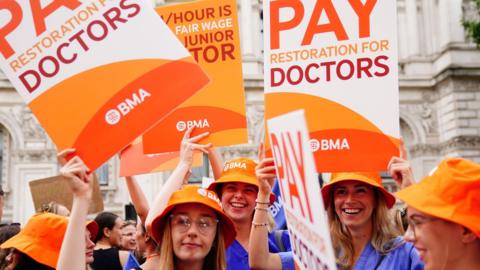The Department of Health said resident doctors, formerly called junior doctors, would get an extra £750 top-up, taking their average pay rise to 5.4%.
Resident doctors took part in 11 separate strikes during 2023 and 2024 as they had been arguing for a 35% increase to make up for 15 years of below-inflation pay awards.
They were given rises worth an average of 22% over the last two years to bring an end to those strikes - and the BMA argues this year's pay award did not do enough to make up that remaining shortfall.
Meanwhile, health unions reacted angrily after a smaller rise of 3.6% was announced for other NHS staff, including nurses, midwives and other front-line workers.
The Royal College of Nursing said it was "grotesque" that nurses had been offered a smaller rise than doctors, which it said would be "entirely swallowed up" by price rises.
The union plans to consult nurses on whether they are happy with the rise, or if they want to move forward with industrial action. If they back the latter, a formal strike ballot could be run.
NHS staff in Wales and Northern Ireland are likely to be given the same pay award, as the governments there have accepted the same recommendations.
In Scotland, NHS nurses, midwives and other healthcare staff have voted to accept a 4.25% increase in 2025-26.
